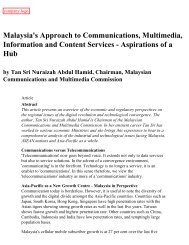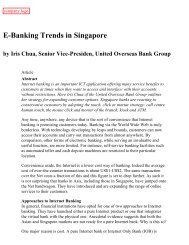Contents - Connect-World
Contents - Connect-World
Contents - Connect-World
Create successful ePaper yourself
Turn your PDF publications into a flip-book with our unique Google optimized e-Paper software.
Billing<br />
are prepared organisationally to introduce<br />
real-time billing principles into<br />
their mainstream markets. Therefore,<br />
for most operators, moving to a convergedprepaid<br />
and postpaidbilling<br />
infrastructure is a huge paradigm<br />
shift. However, the payoff makes such<br />
a change worthwhile.<br />
Open door to data services<br />
Real-time billing is highly flexible,<br />
allowing tariff plans to be changed<br />
dynamically, offering creative valuebased<br />
methods of billing for new data<br />
services and enabling easy support of<br />
the multitude of emerging new content<br />
providers. Capitalising on such<br />
flexibility, operators, for example, now<br />
can charge for services based on their<br />
perceived value.<br />
With a range of data services such as<br />
video and multimedia messaging service<br />
(MMS) in place, the complexity of<br />
subscriber packages increases, as does<br />
the importance of real-time billing in<br />
the network.<br />
In order to fully realise the revenue<br />
potential of these new services, it is<br />
essential to leverage real-time billing<br />
for all voice and data transactions, the<br />
authorisation of every service request,<br />
the imposing of a credit limit on all<br />
accounts and instant availability of<br />
usage information.<br />
Affordable option for all<br />
Real-time billing is not only about new<br />
service availability, but also about<br />
affordability. With advanced billing<br />
systems, new services are an affordable<br />
alternative for both operators and<br />
subscribers. As mentioned earlier,<br />
real-time billing limits operator credit<br />
risk, which, in turn, reduces overall<br />
service cost. At the same time, subscribers<br />
can access new services without<br />
exceeding a predetermined budget.<br />
Moreover, with real-time billing,<br />
subscribers pay only for the content<br />
and services they actually want, rather<br />
than paying for a high-priced content<br />
package of which, they are not likely to<br />
take full advantage.<br />
For the enterprise, the cost benefits<br />
can be even greater. With real-time<br />
billing, mobile phones issued by companies<br />
to their employees can, in fact,<br />
operate via two accounts business<br />
and personal. As a result, employees<br />
can access their business account for<br />
the full range of data services that can<br />
improve business communications<br />
and ultimately lead to more productivity<br />
and success. At the same time, they<br />
can access their personal account with<br />
the same mobile phone, while the<br />
employer does not pick up the tab.<br />
Boon for emerging markets<br />
Real-time billings impact can be felt<br />
in all corners of the globe, particularly<br />
in emerging markets. Given the<br />
opportunity to introduce easily the<br />
most advanced services, emerging<br />
markets no longer lag behind the rest<br />
of the pack, but instead have leaped<br />
forward to reach a level on par with<br />
the developed world.<br />
With real-time billing, all operators<br />
whether in emerging, developed or<br />
advanced marketscan offer an<br />
extensive portfolio of advanced voice<br />
and data services to their entire subscriber<br />
base. As a result, all services<br />
for all subscribers is no longer a pipe<br />
dream but a reality for all providers.<br />
If there was concern that investing in a<br />
state-of-the-art real-time billing system<br />
would deter new operators, particularly<br />
in emerging markets, the<br />
opposite has proved true. Real-time<br />
billing is ideally suited for green-field<br />
deployments, since such implementation<br />
does not require any integration<br />
or adaptation, unlike instances where<br />
legacy systems already exist.<br />
Real-time billing has put emerging<br />
markets on the map. One area that has<br />
benefited is Asia Pacific, which is ideally<br />
suited for these next-generation<br />
systems due to the popularity of prepaid<br />
services there. Most mobile subscribers<br />
in many parts of the region<br />
are prepaid, sometimes reaching up to<br />
95 per cent of an operators entire customer<br />
base.<br />
With the prepaid market growing rapidly<br />
in the region, real-time billing systems,<br />
which are most suited for supporting<br />
this growth, are likely to<br />
become an even more integral part of<br />
the industry.<br />
The adoption of new billing systems<br />
has, in fact, enabled nations such as<br />
Indonesia, India and Malaysia to gain<br />
a foothold at the forefront of the<br />
mobile phone world.<br />
Also in Indonesia<br />
Take, for example, the new<br />
Indonesian operator Mobile-8<br />
Telecom. As a newcomer in a fiercely<br />
competitive field, Mobile-8 required a<br />
secure real-time service offering for<br />
integrated control and support of both<br />
its prepaid and postpaid subscriber<br />
operations. As a result, the company<br />
recently deployed a real-time billing<br />
system to address all voice and data<br />
billing needs.<br />
The end-to-end solution supports<br />
billing for prepaid and postpaid subscribers,<br />
voice and data services and<br />
customer relationship management<br />
(CRM), while enabling the authorisation<br />
of all subscribers service requests<br />
in real-time.<br />
The real-time billing system allows<br />
Mobile-8 to concentrate on its core<br />
business — providing top-quality services<br />
to subscribers — regardless of the<br />
payment system. By implementing a<br />
state-of-the-art system, together with<br />
fully integrated customer care software,<br />
Mobile-8 is well positioned as a<br />
new player in the Indonesian mobile<br />
telephony market.<br />
Enhance personalisation,<br />
reduce churn<br />
Real-time billing also can play a role in<br />
tackling one of the industrys most<br />
burning issues — churn. One way to<br />
address the problem is by reducing<br />
acquisition costs — but this is much<br />
like treating a symptom. Service personalisation<br />
is a better solution, since<br />
it vaccinates against the disease in the<br />
first place.<br />
As creatures of habit, the more comfortable<br />
we feel, the less likely we are<br />
to contemplate change. Service personalisation,<br />
which is enabled by realtime<br />
billing, has the potential to<br />
become a highly effective way to fight<br />
the problem of churn by making subscribers<br />
feel more comfortable.<br />
When subscribers can select their tariff<br />
plan, choose preferred locations for<br />
discounted calls and transfer credit<br />
between accounts, they are less likely<br />
to switch operators due to the hassle<br />
of having to completely redefine their<br />
mobile environment. They are even<br />
less likely to churn if the same personalisation<br />
options are unavailable elsewhere.<br />
A different world<br />
The new and improved billing systems<br />
of today are clearly making their mark<br />
on the mobile phone industry.<br />
Facilitating instant availability of<br />
information, dynamic and interactive<br />
marketing programmes, creative<br />
value-based pricing schemes and convenient<br />
service personalisation for<br />
each and every end user are just some<br />
of the ways that life in a world with<br />
real-time billing is different for operators.<br />
At the same time, real-time<br />
billing blurs the lines between emerging<br />
and developed markets, affording<br />
unprecedented equal opportunities to<br />
all operators and subscribers worldwide.<br />
<br />
62
















